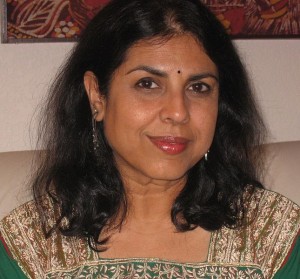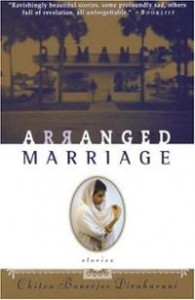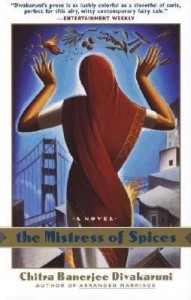Biography

Chitra Banerjee Divakaruni is an award-winning author and poet. Her work is widely known, as she has been published in over 50 magazines, and her writing has been included in over 30 anthologies.
She was born in India in 1956 and lived there until 1976, when, at age nineteen, she left Kolkata and came to the United States. She continued her education in the field of English by receiving a Master’s degree from Wright State University in Dayton, Ohio, and a Ph.D. from the University of California at Berkeley. To earn money for her education, she held many odd jobs, including babysitting, selling merchandise in an Indian boutique, slicing bread in a bakery, and washing instruments in a science lab. At Berkeley, she lived in the International House and worked in the dining hall, slicing Jell-O and removing dishes from the dishwasher. She briefly lived in Chicago and Ohio before she settled in Sunnydale, California in 1979. She currently lives in Houston, Texas and teaches at the University of Houston Creative Writing Program. Since 1991, she has been the president of MAITRI, a helpline for South Asian women that particularly helps victims of domestic violence and other abusive situations. She is also involved with Pratham, a non-profit that seeks to improve literacy among disadvantaged Indian children. She has said that the one word which would describe her is “enthusiastic” and she that she is motivated to be excellent in her field and to create literary art of lasting value (qtd in “Profiles”). She sees herself as “a listener, a facilitator, a connector to people,” and, “to me, the art of dissolving boundaries is what living is all about” (“Dissolving” 2).
Major Themes

Much of Divakaruni’s work is partially autobiographical. Most of her stories are set in the Bay Area of California. She is is invested in writing about the immigrant experience. Her book, Arranged Marriage, is a collection of short stories about women from India caught between two worlds (see Arranged Marriage, Matchmakers and Dowries in India). In The Mistress of Spices, the character Tilo provides spices, not only for cooking, but also for the feelings of homesickness and alienation that the Indian immigrants in her shop experience (Softky 1997). Divakaruni writes to unite people by destroying myths and stereotypes. As she breaks down these myths and stereotypes, she dissolves boundaries between people of different backgrounds, communities, ages, and even different worlds. She says, “Women in particular respond to my work because I’m writing about them, women in love, in difficulties, women in relationships. I want people to relate to my characters, to feel their joy and pain, because it will be harder to [be] prejudiced when they meet them in real life” (qtd. in Softky). Divakaruni’s interest in women began after she left India, at which point she reevaluated the treatment of women there. At Berkeley, she volunteered at a women’s center and became interested in helping battered women. She then started MAITRI with a group of friends, which eventually led her to write Arranged Marriage (see Gender and Nation, The Spice Trade in India, Third World and Third World Women).
The book of short stories, Arranged Marriage, and her subsequent novel, The Mistress of Spices, are both highly acclaimed works. In Arranged Marriage, Divakaruni beautifully tells stories about immigrant brides who are “both liberated and trapped by cultural changes” and who are struggling to carve out an identity of their own (Holt 1). In one story, “Doors,” the character Preeti, after moving to the United States, has come to love the Western idea of privacy. She faces a dilemma when her husband’s cousin wants to come live with them. She expresses her discontent with the situation and thus demonstrates her new found decisiveness and resistance to her husband’s view of a traditional Indian wife. In another story, “Clothes,” the husband of the narrator, Sumita, dies and she is faced with the decision of staying in America or going back to India to live with her in-laws. Sumita calls widows who are serving their in-laws in India “doves with cutoff wings.” Divakaruni deals with a variety of issues in the book, including racism, interracial relationships, economic disparity, abortion, and divorce. She says that the stories are inspired by her imagination and the experiences of others (Mehta 4).

The Mistress of Spices is unique in that it is written with a blend of prose and poetry. The book has a very mystical quality to it, and, as Divakaruni puts it, “I wrote in a spirit of play, collapsing the divisions between the realistic world of twentieth century America and the timeless one of myth and magic in my attempt to create a modern fable.” (“Dissolving” 2) (see Magical Realism). The novel follows Tilo, a magical figure who runs a grocery store and uses spices to help the customers overcome difficulties. In the process, she develops dilemmas of her own when she falls in love with a non-Indian. This creates great conflicts, as she has to choose whether to serve her people or to follow the path leading to her own happiness. Tilo has to decide which parts of her heritage she will keep and which parts she will chose to abandon. The novel was later made into a movie of the same name in 2005.
Divakaruni’s 1999 novel, Sister of My Heart, is about the lives of two women and how they change marriage as one woman comes to California, and the other stays behind in India. The Vine of Desire (2002) continues the story of the two friends. The Unknown Errors of Our Lives is a collection of stories “about family, culture, and the seduction of memory” (book jacket).
Chitra Divakaruni is the editor of Multitudes, an anthology she uses in her own classroom. She states about the book, “I didn’t want to sacrifice quality, and [the stories] focus on problem solving, not just how terrible things are” (qtd. in Softky). The anthology includes stories about communication styles across cultures, expectations of friendships, the Los Angeles riots, and prejudice against gay people. The book contains works by a variety of authors, and some are even by her own students.
Before she began her career in fiction writing, Divakaruni was an acclaimed poet. She writes poems encompassing a wide variety of themes, and she once again directs much focus to the immigrant experience and to South Asian women. She shows the experiences and struggles involved in women trying to find their own identities. Divakaruni’s latest collection, Leaving Yuba City, is unique because it includes series of poems based on and inspired by various art forms, including paintings by Francesco Clemente, photographs by Raghubir Singh, and specific Indian films, such as “Salaam Bombay.” With these poems, Divakaruni once again shows how boundaries can be destroyed. Her verse illustrates how different art forms are not independent entities, but how they can, in fact, influence each other. The following is a poem from Black Candle, which contains poems about women from the India, Pakistan, and Bangladesh (see Bollywood and Women).
The Arranged Marriage
The night is airless-still, as
before a storm. Behind the wedding drums,
cries of jackals from the burning grounds.
The canopy gleams, color
of long life, many children.
Color of bride-blood. At the entrance
the women have painted a sign
of Laxmi, goddess of wealth, have put up
a blackened pot to ward off
the witch who lives beyond
the Sheora forest and eats
young flesh.
Guests from three villages
jostle, making marriage jokes. A long
conch blast for the groom’s party,
men in dhotis white as ice. Someone runs to them
with water of rose, silvered betal leaves,
piled garlands from which rise
the acrid smell of marigolds.
The priests confer, arrange wood and incense
for the wedding fire. The chants begin.
Through smoke, the stars
are red pinpricks, the women’s voices
almost a wailing. Uncles and brothers
carry in the bride, her face hidden
under an edge of scarlet silk, her trembling
under the wedding jewels.
The groom’s father
produces his scales and in clenched silence
the dowry gold is weighed. But he smiles
and all is well again. Now it is godhuli,
the time of the auspicious seeing.
Time for you, bride of sixteen,
mother, to raise the tear-stained face
that I will learn so well,
to look for the first time into
your husband’s opaque eyes (14-15).
Major Works
Poetry
- Divakaruni, Chitra Banerjee. Dark Like the River (1987)
- —. The Reason for Nasturtiums (1990)
- —. Black Candle (1991)
- —. Leaving Yuba City (1997)
Fiction
- Divakaruni, Chitra Banerjee. Arranged Marriage: Stories. New York: Anchor Books, 1995.
- —. The Mistress of Spices. New York. Anchor Books, 1997.
- —. Sister of My Heart. New York: Anchor Books, 1999.
- —. The Unknown Errors of our Lives . New York: Doubleday, 2001.
- —. Neela: Victory Song. Middleton: Pleasant Company, 2002.
- —. The Vine of Desire. New York: Doubleday, 2002.
- —. The Conch Bearer. Book One of the Brotherhood of the Conch. New York: Roaring Brook Press, 2003.
- —. Queen of Dreams. New York: Doubleday, 2004.
- —. The Mirror of Fire and Dreaming: Book Two of the Brotherhood of the Conch. New York: Roaring Brook Press, 2005.
- —. The Palace of Illusions: A Novel. New York: Doubleday, 2008.
- —. Shadowland: Book Three of the Brotherhood of the Conch. New York: Roaring Brook Press, 2009.
- —. One Amazing Thing. New York: Hyperion, 2010.
- —. Oleander Girl. New York: Simon & Schuster, 2013.
- —. Before We Visit the Goddess. New York: Simon & Schuster, 2016.
Other
- Divakaruni, Chitra Banerjee. Multitude: cross-cultural anthology. New York: McGraw-Hill, 1993.
- —. We Too Sing America. New York: McGraw-Hill, 1997.
- —. California Uncovered: Stories for the 21st Century. Berkeley: Heyday Books, 2004.
Awards and Honors
- 1995: The American Book Award for Arranged Marriage: Stories
- 1995 PEN Oakland/Josephine Miles Literary Award for Arranged Marriage: Stories
- 1995 Bay Area Book Reviewers Award for Fiction for Arranged Marriage: Stories
- 1997: The Allen Ginsberg Poetry Prize and the Pushcart Prize for poems in Leaving Yuba City: New and Selected Poems
- 1997: Mistress of Spices shortlisted for The Orange Prize
- 1997: Los Angeles Times Best Books of 1997 for Mistress of Spices
- 1998: Seattle Times Best Paperbacks of 1998 for Mistress of Spices
- 1999: “Mrs. Dutta Writes a Letter” included in Best American Short Stories
- 2003: “The Lives of Strangers” included in O’Henry Prize Stories
- 2003: Pushcart Prize for “The Lives of Strangers”
- 2007: Distinguished Writer Award from the South Asian Literary Association
- 2008: University of California at Berkeley International House Alumna of the Year Award
- 2009: Cultural Jewel Award from the Indian Culture Center, Houston
- 2011: Light of India Jury’s Award for Journalism and Literature
- 2015: Premio Scanno Award for Literature, Italy
Selected Bibliography
- Albert, Janice. “How now, my metal of India?” English Journal (Sept 1997): 99-100.
- Divakaruni, Chitra. Black Candle. Corvallis: CALYX Books,1991.
- —.”Chitra Banerjee Divakaruni.” San Francisco Chronicle (24Dec 1995): A10.
- —. “Dissolving Boundaries.” (1997). Web. <http://headlines.entertainmentmarket.com/boldtype.divakaruni.article$597>
- Holt, Patricia. “Women feel tug of two cultures.” San Francisco Chronicle (1 Aug 1995): E5.
- Mehta, Julie. “Arranging One’s Life.” (1996). Web. <http://www.metroactive.com/papers/metro/10.03.96/books-9640.html>
- “Profiles: Chitra Banerjee Divakaruni.” Web. <http://www.helloindia.com/profiles/profile.shtml>
- Softky, Elizabeth. “Cross-cultural understanding spiced with the Indian Diaspora.” Black Issues in Higher Education (18 Sept 1997): 26+.
Related Sites
MAITRI homepage
http://www.maitri.org/
Author: Nilu N. Patel, Spring 1998
Last edited: May 2017
1 Comment
Hi Mam
This is Asha phd scholar, my topic is food and identity in chitra Banerjee Divakaruni’Select novels i’m very much proud to do that.I would like to have your suggestions.